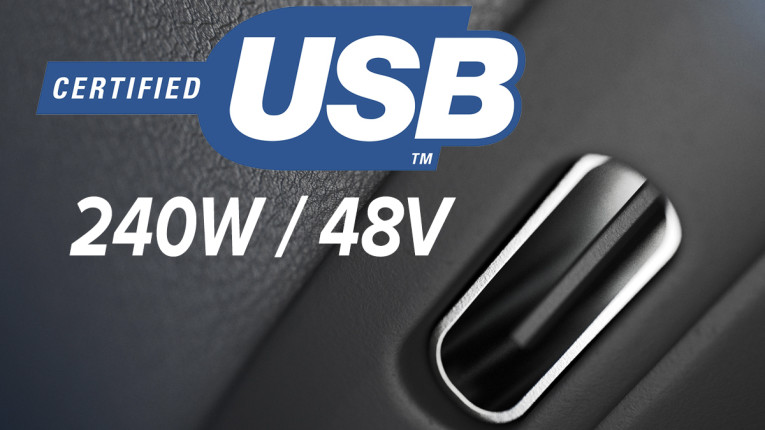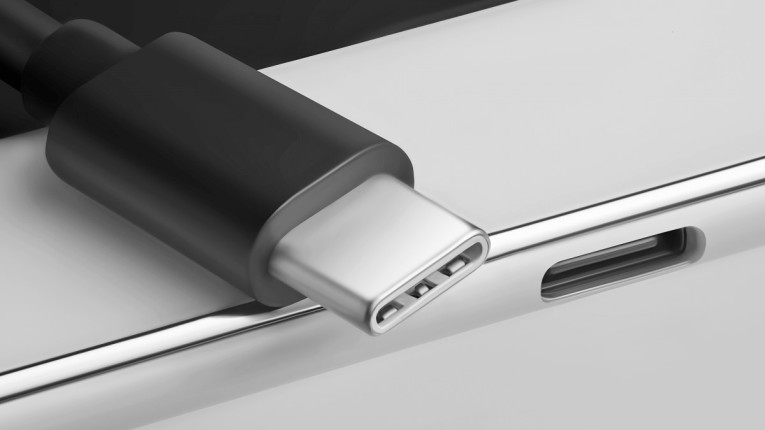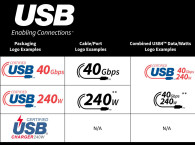
Prior to this update, USB PD was limited to 100W via a solution based on 20V using USB Type-C cables rated at 5A. The USB Type-C specification has also been updated with Release 2.1 to define 240W cable requirements, and with the updated USB PD protocol and power supply definition, this extends the applicability of USB PD to a large number of applications where 100W wasn’t adequate.
The USB PD 3.1 specification describes a choice of three new fixed voltages: 28V (above 100W), 36V (above 140W) and 48V (above 180W) joining previously defined 5V, 9V, 15V and 20V fixed voltages. This means that supplying power to condenser microphones, large TVs and displays, or powering large network setups from a single USB-C adapter converted to PoE becomes a possibility. For audio applications, particularly for professional applications, the new adjustable voltage mode enabling a range from 15V to one of three maximum voltages (28V, 36V, or 48V) depending on the available power, allows the device being powered to request specific voltages to a 100 mV resolution.
The new USB Power Delivery architecture also defines a much more stringent power negotiation protocol that helps to ensure that access to and use of this higher power capability can be done safely. It should be noted that safety requirements for products that use power in the range of 100 - 240W are also more stringent than lower power products and are defined by the applicable safety specifications dictated by the regulations for each country where the products will be sold.
“With the new capabilities of USB Power Delivery 3.1, we now enable higher power products such as larger notebook PCs to shift from traditional power connectors to USB Type-C,” says Brad Saunders, USB Promoter Group Chairman. “We also anticipate a wider range of product application developers outside of the traditional USB ecosystem to now consider standardizing on USB Type-C with USB PD power their power needs.”
This update is part of the USB performance roadmap and is specifically targeted to developers at this time. Branding and marketing guidelines are being established and will include a new cable labeling solution to inform users of the power capability supported by Certified USB Type-C cables.

“Always responsive to the market’s need for a higher-power, truly universal bus connector, the USB Promoter Group has again been quick to recognize and adapt its specifications for charging capability to anticipate customer requirements, potentially creating new markets for USB Power Delivery. ST, as an active member of the USB Promoter Group, with its strong company legacy of cooperation, technical expertise, and product reliability, will continue to provide high-quality, optimized semiconductor solutions,” says Matteo Lo-Presti, Executive Vice President, Analog, Sub-Group General Manager, Analog MEMS, and Sensors Group, STMicroelectronics.
“The 3.1 revision to the USB Power Delivery specification, which includes the capability to provide up to 48V and 240W of power, will help enable additional design opportunities for current and new users of USB Type-C technology,” says Deric Waters, senior member of technical staff at Texas Instruments.
USB Developer Days 2021, in the second half of this year, will include detailed technical training covering the updated USB PD and USB Type-C specifications. The USB Promoter Group, comprised of Apple, Hewlett-Packard, Intel, Microsoft, Renesas Electronics, STMicroelectronics, and Texas Instruments, continues to develop the USB family of specifications to meet the market needs for increased functionality and performance of USB solutions.
www.usb.org







